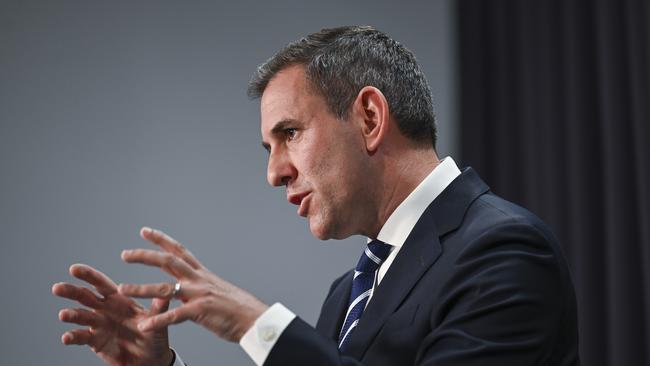Chalmers’ latest weak growth figures show our future prosperity is at risk, economists warn
As the economy tanks, economists have warned Australia is putting a “bright economic future” in jeopardy by allowing the government to crowd out the private sector.
National
Don't miss out on the headlines from National. Followed categories will be added to My News.
Australia is risking a “bright economic future” by allowing government to crowd out the private sector, economists have warned, after Treasurer Jim Chalmers handed down some of the worst growth numbers Australia has seen since the 1990s.
“We are going backwards in terms of our living standards,” said EQ Economics managing director Warren Hogan.
“Our productivity is falling, our government is growing, and if this is our new economy, than our standards of living as one of the world’s wealthiest countries is going to go away.”
According to Hogan, a rapid growth in government is threatening our prosperity.
“There is a bright future ahead, there incredible technologies on the horizon, and Australia is as well positioned to grow as it has been in the past 30 years but the only thing that has changed is our economic policy strategy.”

“Bigger government is not what delivered our modern wealth, it was modest government that was disciplined from the 1980s through to just before the pandemic, and I am worried that the trend of the last couple of years is going to undermine the vitality of the economy,” he said.
The figures, which showed GDP barely growing at one per cent per year and per capita GDP moving backwards for the sixth consecutive quarter, has led to Dr Chalmers being compared to his disastrous Whitlam-era predecessor Jim Cairns.
The gibe, first made by ANU economist Steven Hamilton in the Australian Financial Review, featured prominently at a Canberra press conference where Dr Chalmers unveiled the latest set of national accounts which outside the pandemic were the worst the country has seen since the 1990s.

Asked about comparisons to the 1970s-era Jim Cairns, Dr Chalmers told reporters Wednesday, “I like that some of the issues that we’re grappling with today are a big part of the national conversation, that’s a good thing.”
“I’m not someone that tries to shy away from feedback,” he added.
But while consumers were being smashed in 1974 – the year Cairns took the reins at Treasury – by 15 per cent inflation, in other ways Australians had it easier.
The average house in Sydney cost around $34,000, or around four and a half times the median weekly wage.
Today, depending on where you want to buy, it costs between nine and 12 times or more the average wage to get into the property market.
Petrol was around 10 cents a litre in 1974, which even adjusted for inflation would mean around 97 cents today.
RMIT economics professor Sinclair Davidson said, “Real Gross Household Income per capita has been trending down for several quarters and is at 2010 levels now.”
“GDP per capita has been falling for several quarters.”
“All the economic indicators are going the wrong way, and what is the government doing? Fighting with the RBA.”
David Alexander, Chief of Policy and Advocacy at the Australian Chamber of Commerce and Industry, said “High migration is masking the backwards movement in GDP per capita, and what we can see is a pattern emerging of economy bigger, people poorer, which is a matter of great concern.”





